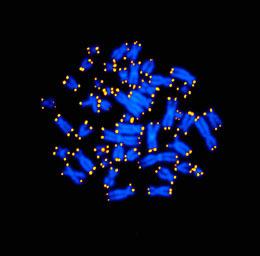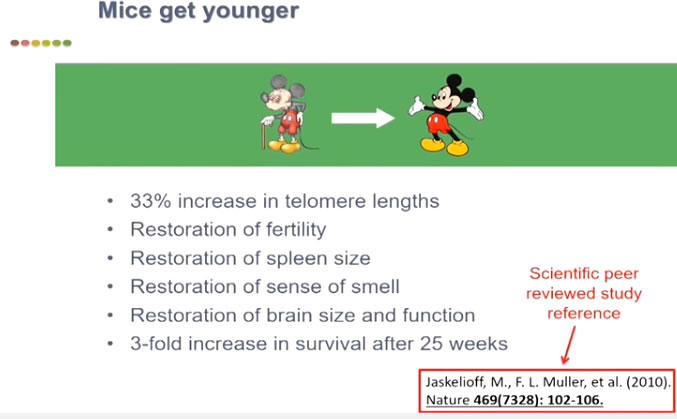Fight the Signs of Ageing: Different Anti-Ageing Supplements
Dramatic rejuvenation of prematurely aged mice hints at potential therapy.
– Ewen Callaway
 Premature ageing can be reversed by reactivating an enzyme that protects the tips of chromosomes, a study in mice suggests.
Premature ageing can be reversed by reactivating an enzyme that protects the tips of chromosomes, a study in mice suggests.
Mice engineered to lack the enzyme, called telomerase, become prematurely decrepit. But they bounced back to health when the enzyme was replaced. The finding, published online today in Nature1, hints that some disorders characterized by early ageing could be treated by boosting telomerase activity.
It also offers the possibility that normal human ageing could be slowed by reawakening the enzyme in cells where it has stopped working, says Ronald DePinho, a cancer geneticist at the Dana-Farber Cancer Institute and Harvard Medical School in Boston, Massachusetts, who led the new study. “This has implications for thinking about telomerase as a serious anti-ageing intervention.”
Other scientists, however, point out that mice lacking telomerase are a poor stand-in for the normal ageing process. Moreover, ramping up telomerase in humans could potentially encourage the growth of tumours.
Eternal Youth
After its discovery in the 1980s, telomerase gained a reputation as a fountain of youth. Chromosomes have caps of repetitive DNA called telomeres at their ends. Every time cells divide, their telomeres shorten, which eventually prompts them to stop dividing and die. Telomerase prevents this decline in some kinds of cells, including stem cells, by lengthening telomeres, and the hope was that activating the enzyme could slow cellular ageing.
Two decades on, researchers are realizing that telomerase’s role in ageing is far more nuanced than first thought. Some studies have uncovered an association between short telomeres and early death, whereas others have failed to back up this link. People with rare diseases characterized by shortened telomeres or telomerase mutations seem to age prematurely, although some tissues are more affected than others.
 When mice are engineered to lack telomerase completely, their telomeres progressively shorten over several generations. These animals age much faster than normal mice — they are barely fertile and suffer from age-related conditions such as osteoporosis, diabetes, and neurodegeneration. They also die young. “If you look at all those data together, you walk away with the idea that the loss of telomerase could be a very important instigator of the ageing process,” says DePinho.
When mice are engineered to lack telomerase completely, their telomeres progressively shorten over several generations. These animals age much faster than normal mice — they are barely fertile and suffer from age-related conditions such as osteoporosis, diabetes, and neurodegeneration. They also die young. “If you look at all those data together, you walk away with the idea that the loss of telomerase could be a very important instigator of the ageing process,” says DePinho.
To find out if these dramatic effects are reversible, DePinho’s team engineered mice such that the inactivated telomerase could be switched back on by feeding the mice a chemical called 4-OHT. The researchers allowed the mice to grow to adulthood without the enzyme, then reactivated it for a month. They assessed the health of the mice another month later.
“What really caught us by surprise was the dramatic reversal of the effects we saw in these animals,” says DePinho. He describes the outcome as “a near ‘Ponce de Leon’ effect” — a reference to the Spanish explorer Juan Ponce de Leon, who went in search of the mythical Fountain of Youth. Shrivelled testes grew back to normal and the animals regained their fertility. Other organs, such as the spleen, liver, and intestines, recuperated from their degenerated state.
The one-month pulse of telomerase also reversed effects of ageing in the brain. Mice with restored telomerase activity had noticeably larger brains than animals still lacking the enzyme, and neural progenitor cells, which produce new neurons and supporting brain cells, started working again.
“It gives us a sense that there’s a point of return for age-associated disorders,” says DePinho. Drugs that ramp up telomerase activity are worth pursuing as a potential treatment for rare disorders characterized by premature ageing, he says, and perhaps even for more common age-related conditions.
Cancer Link?
The downside is that telomerase is often mutated in human cancers, and seems to help existing tumours grow faster. But DePinho argues that telomerase should prevent healthy cells from becoming cancerous in the first place by preventing DNA damage.
David Sinclair, a molecular biologist at Harvard Medical School in Boston, agrees there is evidence that activating telomerase might prevent tumours. If the treatment can be made safe, he adds, “it could lead to breakthroughs in restoring organ function in the elderly and treating a variety of diseases of aging.”
Other researchers are less confident that telomerase can be safely harnessed. “Telomere rejuvenation is potentially very dangerous unless you make sure that it does not stimulate cancer,” says David Harrison, who researches ageing at the Jackson Laboratory in Bar Harbor, Maine.
Harrison also questions whether mice lacking telomerase are a good model for human ageing. “They are not studying normal ageing, but ageing in mice made grossly abnormal,” he says. Tom Kirkwood, who directs the Institute for Ageing and Health at Newcastle University, UK, agrees, pointing out that telomere erosion “is surely not the only, or even dominant, cause” of ageing in humans.
DePinho says he recognizes that there is more to ageing than shortened telomeres, particularly late in life, but argues that telomerase therapy could one day be combined with other therapies that target the biochemical pathways of ageing. “This may be one of several things you need to do in order to extend lifespan and extend healthy living,” he says.
Dr. Bill Andrews asks, “So, anti-aging scientists must be out of their minds to want to turn the telomerase gene on, right?
“No! Although telomerase is necessary for cancers to extend their lifespan, telomerase does not cause cancer. This has been repeatedly demonstrated: at least seven assays for cancer have been performed on telomerase-positive human cells: the soft agar assay, the contact inhibition assay, the mouse xenograft assay, the karyotype assay, the serum inhibition assay, the gene expression assay, and the checkpoint analysis assay. All reported negative results.”²,3
Balance Is Everything
There is a need for balance”, says John, the Senior Research Scientist at Rumba Nutrition. “Just as it a person can suffer from drinking too much water, where the kidneys are unable to excrete the excess water, the electrolyte (mineral) content of the blood is diluted, resulting in low sodium levels in the blood, a condition called hyponatremia.
“At Rumba Nutrition, we have made this balance. It is like have a super nutrient dietary supplement in a bottle. A good balance can boost your health, the effect which you will see in your skin.”
One very good news is that the particular product, which addresses this impossibility is made available in the market via Flawless Supplement.
Rumba’s FLAWLESS supplement combines liposomal Vitamin C with Astragalus to effectively help your body boost its natural supply of telomerase with a much longer lasting effect.
BENEFITS:
- Skin improvement at the cellular level
- Effectively diminishes wrinkles and folds – face and neck
- Reduces the signs of visible aging
- Boosts skin plumpness and youthfulness
- Helps even out discoloured and blotchy skin tones
- Provides antioxidant protection
- Increases skin firmness and tone
- Maintains hydration in the skin
=====
- Main article from: Telomerase reverses ageing process
- Cure Aging or Die Trying
- Jiang, X.-R. et al. Telomerase expression in human somatic cells does not induce changes associated with a transformed phenotype. Nature Genet., 21, 111-114 (1999); Morales, C.P., et. al. Absence of cancer-associated changes in human fibroblasts immortalized with telomerase. Nature Genet., 21, 115-118 (1999); Harley, C. B. Telomerase is not an oncogene. Oncogene 21(4): 494-502 (2002).


Having read this I thought it was rather informative. I appreciate you spending some time and energy to put this information together. I once again find myself spending way too much time both reading and leaving comments. But so what, it was still worth it!
Thank you for the auspicious writeup. It in fact was a entertainment account it. Look advanced to far brought agreeable from you! By the way, how can we be in contact?